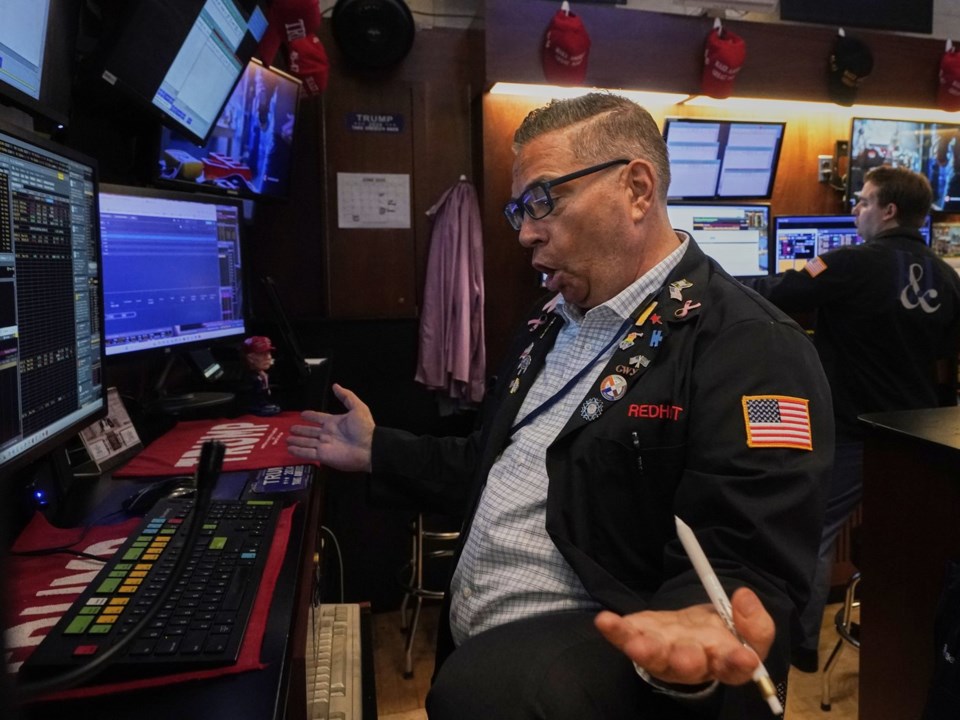NEW YORK (AP) — U.S. stocks are drifting as the world’s two largest economies begin talks on trade that could help avoid a recession. The S&P 500 was little changed in early trading Monday. The Dow Jones Industrial Average slipped 79 points, or 0.2%, and the Nasdaq composite was up 0.1%. Officials from the U.S. and China are meeting in London to talk about a range of disputes. Hopes that President Donald Trump will lower his tariffs after reaching trade deals with countries around the world have helped send the S&P 500 surging in recent weeks. Warner Bros. Discovery jumped after saying it would split into two companies.
THIS IS A BREAKING NEWS UPDATE. AP’s earlier story follows below.
HONG KONG (AP) — Global markets were mixed on Monday as investors waited to see the outcome of trade talks between Washington and Beijing in London.
The futures for the S&P 500 and the Dow Jones Industrial Average were 0.1% higher.
The CAC 40 in Paris lost 0.1% to 7,797.64 and Germany's DAX edged 0.4% lower to 24,210.06.
The British FTSE 100 was little changed at 8,836.20.
In Asian trading, Tokyo's Nikkei 225 gained 0.9% to 38,088.57 as the government reported that the Japanese economy contracted by 0.2% in the January-March quarter.
In South Korea, the Kospi added 1.6% to 2,855.77.
Chinese markets rose even though the government reported that exports slowed in May, growing 4.8% from a year earlier after jumping more than 8% in April. Exports to the United States fell 35% in May and nearly 10% in January-May in annual terms.
China also reported that consumer prices fell 0.1% in May from a year earlier, marking the fourth consecutive month of deflation.
Hong Kong's Hang Seng picked up 1.6% to 24,181.43 while the Shanghai Composite Index climbed 0.4% to 3,399.77.
Australia's markets were closed for a holiday.
On Friday, stocks gained ground on Wall Street following a better-than-expected report on the U.S. job market.
The gains were broad, with every sector in the S&P 500 rising. That solidified a second consecutive winning week for the benchmark index, which has rallied back from a slump two months ago to come within striking distance of its record high.
The S&P 500 rose 1% and the Dow industrials lost 1%. The Nasdaq gained 1.2%.
Technology stocks, with their outsized values, led the broad gains. Chipmaker Nvidia jumped 1.2% and iPhone maker Apple rose 1.6%.
Tesla rose 3.7%, regaining some of the big losses it suffered on Thursday when Trump and Musk sparred feverishly on social media.
Circle Internet Group, the U.S.-based issuer of one of the most popular cryptocurrencies, rose 29.4%. That adds to its 168% gain from Thursday when it debuted on the New York Stock Exchange.
U.S. employers slowed their hiring last month, but still added a solid 139,000 jobs amid uncertainty over President Donald Trump’s trade war. The closely watched monthly update reaffirmed that the job market remains resilient, despite worries from businesses and consumers about the impact of tariffs on goods going to and coming from the U.S. and its most important trading partners.
Hopes that Trump will lower his tariffs after reaching trade deals with other countries are a main reason the S&P 500 has rallied back so furiously since dropping roughly 20% two months ago from an all-time high.
The economy is absorbing the impact from tariffs on a wide range of goods from key trading partners, along with raw materials such as steel. Heavier tariffs could hit businesses and consumers in the coming months.
The U.S. economy contracted during the first quarter. Recent surveys by the Institute for Supply Management, a trade group of purchasing managers, found that both American manufacturing and services businesses contracted last month. On Tuesday, the Organization for Economic Cooperation and Development forecast 1.6% growth for the U.S. economy this year, down from 2.8% last year.
The uncertainty over tariffs and their economic impact has put the Federal Reserve in a delicate position.
In other trading early Monday, U.S. benchmark crude oil lost 21 cents to $64.37 per barrel. Brent crude, the international standard, gave up 23 cents to $66.24 per barrel.
The U.S. dollar retreated to 144.09 Japanese yen from 144.85 yen. The euro edged higher, to $1.1426 from $1.1399.
Jiang Junzhe, The Associated Press



